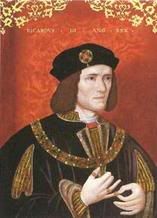
For the past three or four years I have really been into reading historical fiction, especially anything having to do with the kings and queens of England. About two years ago I read A Rose for the Crown by Anne Easter-Smith. This novel offered a much kinder take on the infamous king Richard III, and I was intrigued by it because everything I had learned about Richard III had, thus far, been negative. History has looked down on this King as is evident in Shakespeare’s play and other various histories. One such history was written by Sir Thomas More, Lord Chancellor in Henry VIII’s court. Richard III has been accused of killing his two nephews so that he himself could take the crown after the death of his brother Edward IV, and he has been accused of killing his queen, Anne Neville, so that he could marry his niece Elizabeth of York. Could it be that we have all been mislead?
That question led me to investigate even further. This is when I happened upon the website for the Richard III Society. The Richard III Society is made up of scholars, historians, novelists and regular everyday people who want to clear good King Richard’s name. One premise is that the surviving histories on Richard III were tainted by Henry VII and the Tudor kings that followed him. This makes sense because it would have been in Henry VII’s best interest to paint Richard III in a bad light. Henry VII had usurped the crown from Richard III, thereby removing the last Plantagenet king from the throne and securing the crown, once again, for himself and the Tudors. It is well known that history is written in the viewpoint of and to the advantage of the winners. Furthermore, these histories are what would be passed down from generation to generation. Shakespeare himself, a patron of Elizabeth I (Tudor), used them as sources when writing his plays.
The historians and writers of the Richard III Society have found overwhelming evidence that may prove that Richard III was not the hunchbacked nephew killer of Shakespeare’s play, but a loyal, kindhearted and noble king who, in fact, was loyal to his brother Edward IV and who had loved his wife Anne Neville since childhood. Richard III’s motto was “Loyaulte me lie”, which is Latin for “Loyalty binds me.” He seemed to have taken this motto very seriously.
Who was Richard III? There are only bits and pieces of the puzzle left that when put together, show only a partial picture; however, I would like to believe that he was the good king that the Richard III Society paints him out to be. Other books worth reading are Sandra Worth’s Rose of York series and her most recent book about Elizabeth of York, The King’s Daughter. Venora Bennet’s book A Portrait of an Unknown Woman is also somewhat pro-Ricardian. The book is mainly about Sir Thomas More and his family but she infers that John Clement (also mentioned in More’s Utopia) may have been Richard of York, one of the boys in the tower. In Bennet’s book (fiction), Richard III did not kill his nephews. It is a secret that is kept amongst More, his humanist counterpart Erasmus, and the painter Hans Holbein. Juicy! I also use the name John Clement in my novel as way of paying homage. My next novel just may be a historical fiction.
Links to authors and books can be found at the bottom of the page.
Works Cited
Richard III Society, American Branch. 9 February 2009. <http://www.r3.org/intro.html>
Image from <http://www.photobucket.com/>

2 comments:
I forget the title, but there was an excellent novel written about Richard that used actual facts (not Shakespeare, who does tend to be political). Everything in the novel but the main character was based on fact, letters, prison budgets, the works.
It made a strong case for Richard not being the killer.
The author had several books in the series addressing historical cases, including the man in the iron mask. I'll see if I can find you the title.
Definitely find the title! I love reading anything about him. :-)
Post a Comment